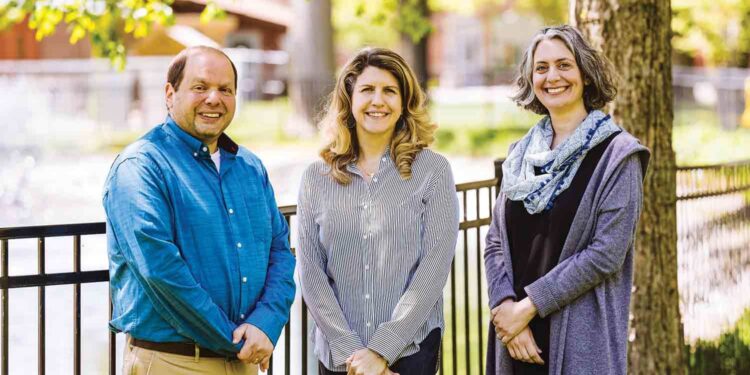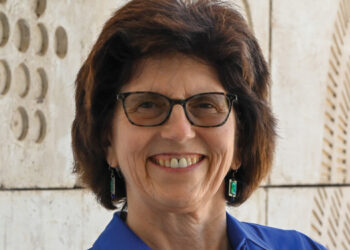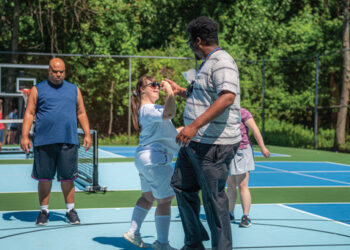As the largest Jewish Community Center in North America, non-denominational and welcoming to all, the philosophy of inclusion serves as a compass for JCC Chicago.
Celebrating 118 years in 2021, JCC Chicago — the largest J system in North America led by Addie Goodman, the JCC’s 12th CEO and president, and the first female to hold this role in the facility’s history — has reimagined itself many times over. And yet, it’s continuing to positively embrace change to this day.
“As a true community center, the J supports the whole person — from health and wellness to lifelong learning to community connection, as an individual’s well-being is multi-faceted,” said Goodman. “It has been incredibly heartwarming to continue this impact over the past year, migrating fitness classes outdoors and online, providing mental health support for all ages, and ensuring no one in the JCC family feels alone.”
This embrace of change can be seen not only in how the J has addressed the COVID-19 pandemic but also throughout history as the J prides itself on growing with its members.
As a college student, Goodman began her career with JCC Chicago as a lifeguard and swim instructor. She even met her husband, Sam, at the J. While Goodman enjoyed teaching children and helping them accomplish new goals, she said what really struck her from Day One was the powerful sense of community that pervaded the space.
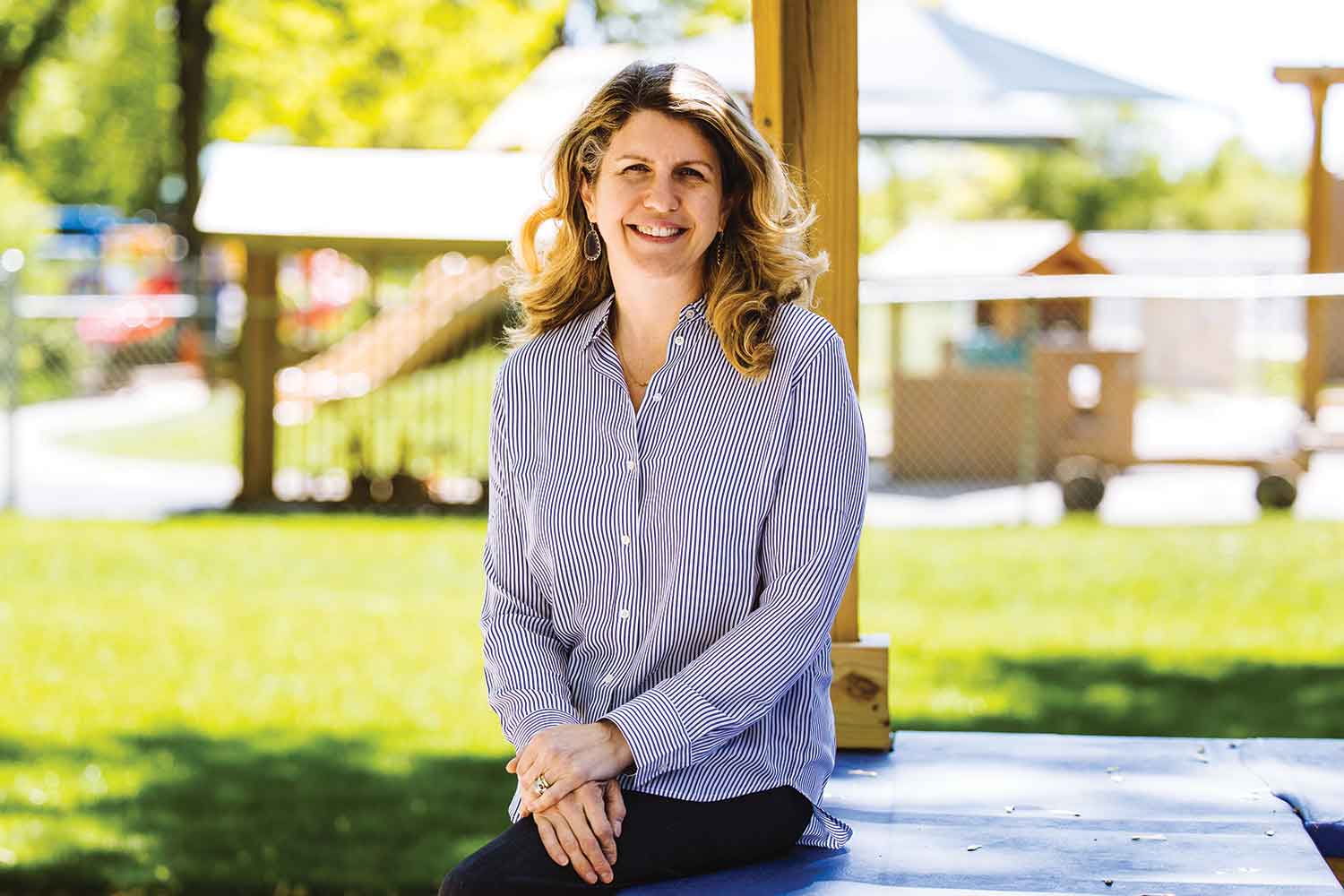
“It felt like family,” said Goodman. “People clearly had connection that was celebrated inside the J and also carried on outside of the J. Today, being part of the J family is at the core of who we are and what we do.”
At JCC Chicago, becoming part of the family can happen at any age. With seven Early Childcare locations, nine day camps, an overnight camp and retreat center, and two full-service community centers — the Bernard Horwich JCC and the Bernard Weinger JCC — it doesn’t matter at what age you join, because the J has community space for all.
Growing Good Kids
For many in the community, joining the J often starts in Early Childhood. Utilizing the Reggio Emilia approach to learning, each classroom emphasizes experiential learning, child-led curriculum and hands-on experiences to focus on the whole child.
Anita Denes-Meador, the chief program officer at JCC Chicago, described this approach as having three teachers — the children, the teachers and the environment. “The teachers are really co-learners, and their main role is to listen and observe instead of lead,” said Denes-Meador. “It really encourages the child’s exploration and learning.”
Additionally, through the approach of the teacher as a co-learner, the activities that are child-led mean they are based off the children’s interests. “It allows the children in the classroom to dive deeper into what their interests are, keeps them learning and growing, and it also builds their self-confidence,” said Denes-Meador. “It gives them the skills to inquire, to negotiate — skills you use in adulthood you might not necessarily think of in a preschool environment. It leads to skills that will help them grow.”
As the third teacher in the classroom, the environment plays a large role in a variety of ways. In Early Childhood, Denes-Meador said it’s all about promoting collaboration and helping children learn to share, negotiate, talk and work through issues together versus having a teacher instruct how to interact.
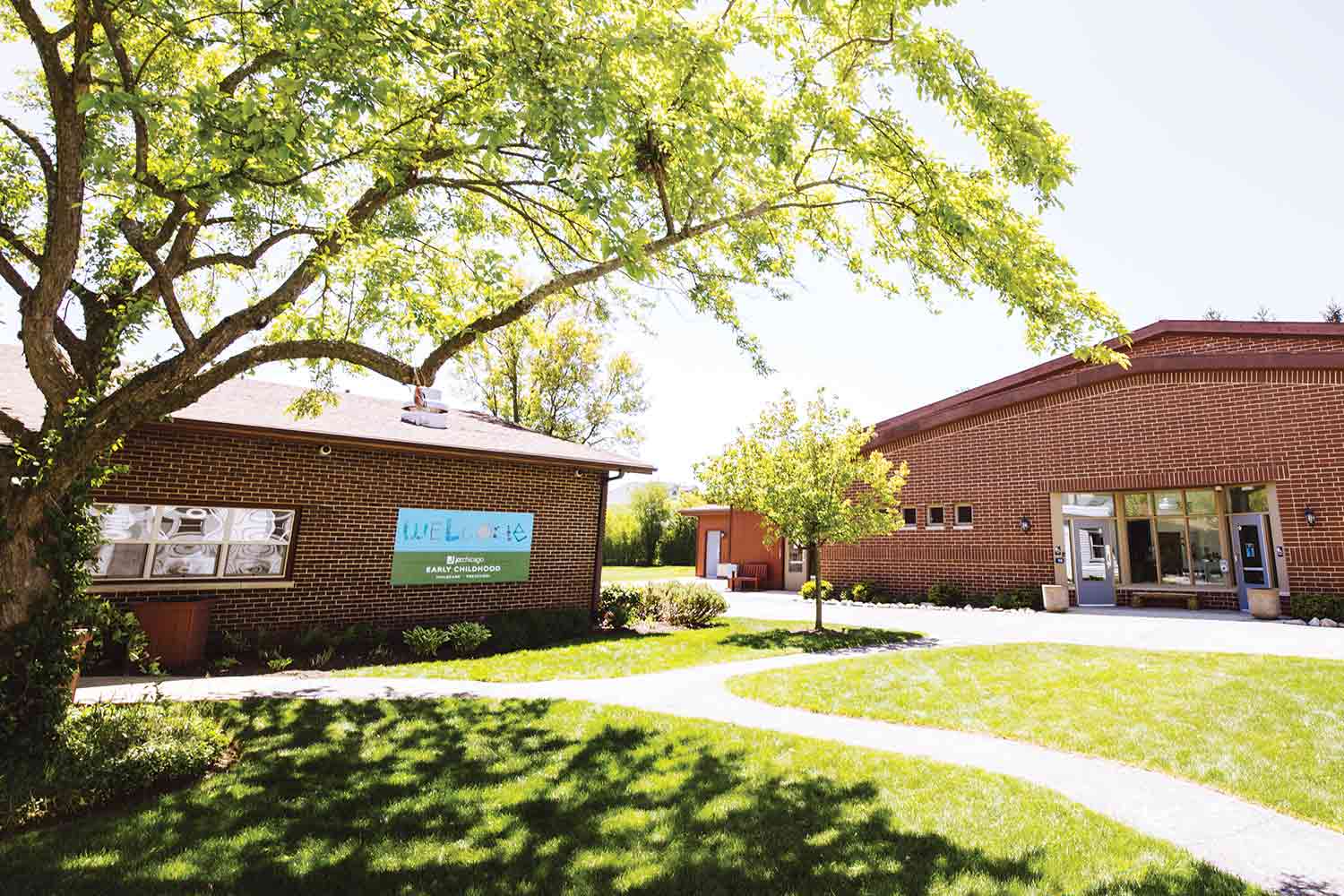
Even prior to COVID-19 and the influx of outdoor programming, using the Reggio Emilia approach, the J has always encouraged utilizing nature. “I think a space to grow — like a garden that allows kids to grow vegetables, flowers, etc. — is important and allows them to see the process,” said Denes-Meador. “We also like to bring things from the outside indoors, so you’ll see a lot of branches hanging in our classrooms with different projects hanging from them. In the winter, teachers bring in snow even in the infant room for those babies to touch and feel.”
Overall, Denes-Meador said Early Childhood at the J is all about growing good kids, interacting with families and helping them foster community. “I think that really puts us in an amazing place to build and grow not only the children but the community,” she said. “We have members who start in Early Childhood, go to camp, become counselors at our day camp, or go to overnight camp and then they become counselors at that overnight camp, and end up with us the whole journey.”
Summer Memories and Lifelong Stories
Brad Finkel, the chief operating officer at JCC Chicago, is the perfect example of growing up as a “J” kid.
Starting as a camper at the overnight Camp Chi and becoming a counselor in 1994, Finkel has now worked full-time for the J since 1998. In fact, both of his children attended Early Childhood and Camp Chi, and one now works within the overnight camp program. “Full circle. To me that’s really the element of community the J provides — that there’s always a place,” he said.
This year, with nine Apachi Day Camps across the city, Finkel said the J is able to geographically serve the community and really customize programming based on the locations. Additionally, when it comes to making camp a success for community members, it’s really about the team of camp directors who make it special and innovative each year.
“We do our best to make sure everybody feels safe, comfortable and healthy in the camp environment,” said Finkel. “Encouragement from our staff to also encourage, provide kindness, teach cooperation, help develop friendships, and promote movement, exploration and development, are also keys and core components to camp.”
This level of encouragement from staff comes from a commitment to training and the dedication of directors who work year-round to put together the best programs for kids when they arrive on Day One.
Staff training at JCC Chicago incudes a variety of opportunities, including participating in American Camp Association programs, bringing in outside trainers and using resources to focus on team building, conflict resolution, and child safety and protection.
Even when it comes to keeping camp fresh year after year, Finkel said it’s the drive of their staff to stay innovative. “Whether it’s going to a camping conference, presenting to other camps, sharing ideas, learning from our Early Childhood directors or just seeing what is out there, it is inspiring to observe how the impact is there,” he said. “Whether it’s the child, camper, staff member, family, grandparents or whoever it may be, it’s inspiring to see them embrace camp. We’re honored to play that role for this community.”
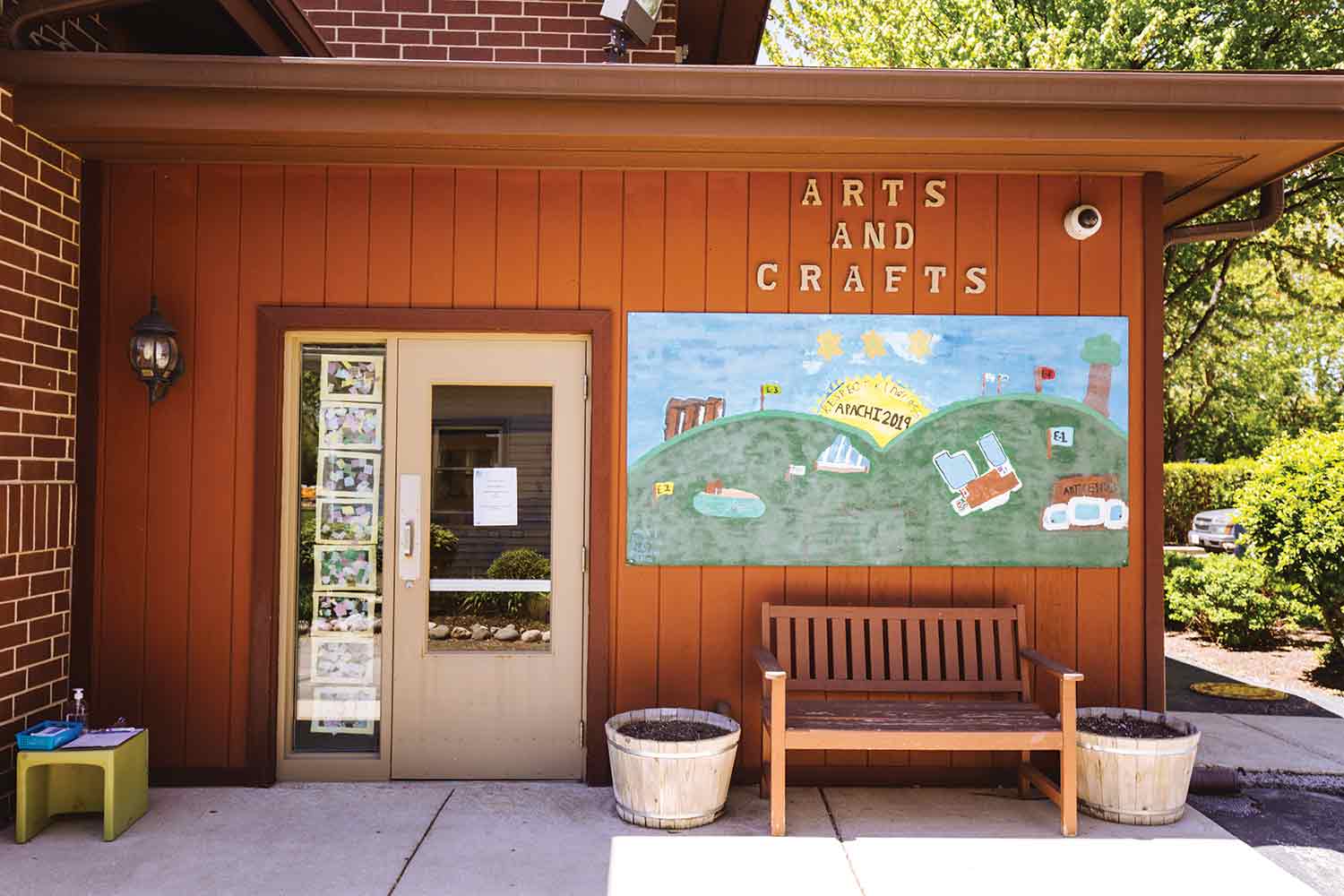
In both of these large components of JCC Chicago, Finkel and Denes-Meador each elaborated that successful Early Childhood and camp services starts with providing a space for all and serves as a guide throughout the lifecycle of programs and services the J offers.
Everybody is Welcome, All the Time
Leading the J, Goodman said one of their biggest points of pride over the past handful of years has been sustaining that lifecycle and further extending the J’s impact. “I anchor inclusion as a philosophy — our organization and programming should be available to everyone, no matter what,” said Goodman. “Everybody is welcome, all the time — there’s nothing that is off limits to any person.”
To help make this happen, Goodman said the J receives a significant amount of scholarship support, so finances aren’t a barrier for people to join programs. Additionally, the J has worked to provide emotional support, intervention and referral services through their Early Childhood social services team that expanded through the pandemic to also support teens and young adults.
Furthermore, the J’s growing number of accessible and adaptive programs demonstrates their philosophy of providing inclusive opportunities for all members of the community.
One such program is All Star Abilities, a peer-to-peer fitness literacy, wellness instruction and recreational opportunity for teenagers in collaboration with community partners. It was created by Goodman’s daughter, Grace Goodman — who graduated in May 2021 from the University of Illinois as a special education major — and classmates Adam Gurin and Matan Cutler, during a social impact project for the Diller Teen Fellowship, a Jewish United Fund led fellowship that focuses on leadership, service and Jewish values. Since the program gained funding and became part of JCC Chicago, it has remained self-sustaining.
“Some of these things come organically to us where we see a need,” said Goodman. “Rather than thinking another person is going to address that need, we recognize our role in stepping up and being of real, relevant and deep service to every community member.”
Another program the J stepped up to provide their community is All-In Swim, designed to teach water safety and swim skills in a comfortable, supportive environment for children with Autism Spectrum Disorder. In the program, certified instructors teach a unique curriculum that focuses on valuable life-saving techniques, recreational swim therapy, and increased independence and self-esteem.
Launched roughly seven years ago, the program has also been self-sustaining and supports the J’s commitment to ensure every child is able to learn the life-saving skill of swimming at an age-appropriate time.
But, Goodman elaborated being inclusive isn’t just providing accessible and adaptive programs. Rather, it is about being inclusive at your core. “We are about building relationships and really delving into deep partnership,” she said. “There are other aspects another entity can be great at and we should all speak to our core competencies. I frankly feel our approach to inclusion is a core competency, and it is high on our strategic list in terms of how we want our organization to be known and in service to the community.”
Being the first female leader in the J’s 118-year history, Goodman said her role is also an aspect of inclusion and equity she keeps in mind. “Every day, it puts me and the team in a mindset of ensuring every human is treated as a full human, and that we don’t categorize people one way or another,” she said. “For us, it’s really everybody gets to play, and everybody benefits when everybody gets to play.”
An Attitude of Gratitude
Despite the impact of a pandemic, Goodman said JCC Chicago has gained confidence in trying new things and taking risks, and she’s excited for the future.
“When I look at the next five years, I’m really excited by registrations for this summer and the next school year — it’s been a bounce-back of epic proportions,” said Goodman. “I’m also really excited about being able to work with a leadership team that has weathered a significant storm, and I’m also excited about continuing to transform the JCC into a true community center, not an organization that offers one program here or another there, or focuses on one constituency as opposed to the whole. I think we’re really much further along in realizing that vision than we were 18 months ago.”
In-line with turning the negatives of the pandemic into positives, Goodman said her team intentionally chose to have an “attitude of gratitude” through an online blog series.
“We felt it would have been very easy for us to ‘woe is me,’ and feel unfortunate about the current circumstances,” said Goodman. “So, from Day One we have celebrated the things we’ve been able to do, and there’s a tremendous amount for which we should be grateful and proud. We work better together, we work more together and we are more creative together. To me, that’s just another view of how we are presenting ourselves to the community and how we hope the community will view our agency. We put families first and we grow good kids.”
Photos by Eric Decker.


